Support strong Canadian climate journalism for 2025
Cherie Wong received an email on July 24 saying her online workspace account had been deactivated. That was when she knew her boss would fire her in their scheduled meeting 90 minutes later.
That was at 2 p.m. By that time, Leila Moumouni-Tchouassi had already been fired.
Half an hour later, Shanese Steele was fired.
All three women were employees of Equal Voice, a multi-partisan group with the goal of empowering young women and achieving equal representation in politics.
Wong is a 23-year-old queer Hong Kong-Canadian who worked for the organization as a policy analyst on a government-funded project that aimed to address systemic barriers that women face in Canada’s legislatures. Moumouni-Tchouassi is a 23-year-old Black Muslim woman who was a delegate and project co-ordinator for Daughters of the Vote event, Equal Voice’s biannual four-day event, to which 338 women, aged 18 to 23, from across Canada are invited to sit in their respective MPs’ seat in Ottawa. And Steele is a 26-year-old Afro-Indigenous woman, who served as Equal Voice’s first official Indigenous co-ordinator.
All three women say they were hired to help the organization become more equitable after Daughters of the Vote delegates alleged in 2017 — and again in April — that Equal Voice had a problem with racial discrimination.
Instead, on July 24, they were fired for the “harassment and defamation of (Equal Voice executive director Eleanor Fast) and Equal Voice both internally and publicly on social media,” according to recordings of the meetings shared with National Observer.
A termination letter, which they say was handed to each of them by Fast, similarly alleges that their social media activity “was highly offensive and incompatible with continued employment at Equal Voice.”
Equal Voice spoke broadly about the matter, declining to answer specific questions about the allegations recounted to National Observer “out of respect for their confidentiality and for legal reasons.”
To some onlookers, the sudden termination of these three women of colour is a manifestation of long-time problems with the organization: discrimination, racism and a general lack of inclusivity.
In her email to National Observer, Fast said that, despite public outrage over the terminations, “recent staffing changes had nothing to do with anyone's race, ethnicity, religion, or any such grounds, nor any attempt to raise concerns regarding equity, diversity, and inclusion. Any insinuation that this is the case is unequivocally false.”
Fast did admit, however, that the organization has a problem. In an email to National Observer, Fast said that Equal Voice recognizes “that there have been significant challenges internally and externally, as Equal Voice is a growing organization and underwent many leadership changes in a short amount of time.”
“We are prepared to do better, and Equal Voice is moving forward on these issues and will take all necessary steps to ensure we are the best workplace we can be, and that our programs reflect this.”

But the three women who came forward about their termination last week, and the dozens more who have since spoken up about their negative experiences with Equal Voice, either in interviews with National Observer or on Twitter under #notsoequalvoice, say that the problem is much deeper than this.
“This is a cultural issue deep within the organization,” Wong said in an interview. “Equal Voice is an organization that has refused to draw the line. Whenever policy or political ideologies are brought up — like why are you supporting this candidate who is blatantly racist? — we don't talk policy, we only talk about, ‘support all women in politics.’
“That's their catchphrase: we support all women no matter what they believe in. And that has manifested into a kind of tolerance for white supremacy. And it's tolerance for sexism, tolerance for ageism, and all the other kinds of discrimination.”
Equal Voice says much of what has been alleged to National Observer and on Twitter is “completely untrue.”
Equal Voice didn't have 'a plan to be better'
In a period of three months, Equal Voice has grown from a three-person operation to having 12 staff employees. Part of the reason for this rapid growth is that the organization has received significant grants from the federal government in 2019 to help increase and strengthen the participation of women in politics.
Among these grants is an almost $350,000 fund for a project called “From Votes to Victory,” which aims to develop social media tools across platforms so women can maximize their participation and engagement, safely, in the online sphere. Equal Voice has also received $3.8 million in funding for two Daughters of the Vote conferences, one of which occurred this year. Recently, the organization was given $1 million for a 36-month project that aims to address some of the key systemic barriers contributing to the under-representation of women in Canadian politics at the provincial, territorial and federal levels.
The three terminated women were hired to work specifically on these projects in some capacity. Wong said the systemic barriers project involved research that no one in Canada had ever done, and was the only reason she joined Equal Voice.
“I had heard all the horror stories,” she said. “I knew what I was getting myself into, but this project mattered more.”
Jacqueline Hall, who was the director of operations at Equal Voice until she left in February, was also hired for one of these projects. She told National Observer that when she first started talking to Equal Voice leadership about inclusion and racism and how to address it through these government-funded programs, her comments “fell on deaf ears.”
“I thought that Equal Voice is really happy to take the money and get the profile that comes with Daughters of the Vote and doing ‘other’ equity work, but not necessarily actually doing the work,” she said.
To illustrate this, Hall said the grant for the systemic-barriers project was received a year and a half before any of Wong, Moumouni-Tchouassi or Steele were hired.
“The project sat on its laurels for over a year, no one did any of the work,” she said. “It was obvious to me that Equal Voice was chasing the buck and not doing the work to be more equitable.”
Since March, the three fired women say, they had been working internally to push the organization to become more open and inclusive to women from all communities and backgrounds.
They prepared a list of action points, including three mediated meetings to understand the needs of the team and set boundaries and guidelines to create a safer work environment; workplace mental health safety training; cultural-competency trainings, to ensure inclusion of all women; an equity and accommodation policy; and a review in Equal Voice’s practices and procedures.
They also pushed for three anti-oppression training sessions for managerial staff, in an effort to increase tolerance and understanding of issues pertaining to marginalized women. And they pushed for the hires of support staff like a diversity co-ordinator, to help create a more inclusive lens for the organization to operate with.
The organization complied with the training, but Wong believes “they were just doing it for show.” The anti-oppression training, for example, was short and served more as a “what is racism” as opposed to “how to stop racism in the workplace,” she explained.
Steele recalled asking Fast whether she had focused on any areas where the organization needed to improve after the anti-oppression training. Fast said no, according to Steele.
“I teach anti-oppression workshops to organizations all the time,” Steele said. “At no point have I ever done one where the management of an organization has not left with actionable item.”
“I was frustrated. We kept talking about the same things over and over again,” Moumouni-Tchouassi said. “I was getting crushed. We were still talking about how to make things work. We didn’t have a plan to be better.”
Fast told National Observer in an email that after the mandated anti-oppression training, “management confirmed we would be following up with actionable items, and subsequent changes related to equity, diversity, and inclusion.”
“At no time did we say or imply that there were no ways in which we could improve as an organization – we recognize we can always do better and need to do better,” she wrote. “Equal Voice fully recognizes that there is room for change and improvement, both internally and externally, in how it operates and implements equity, diversity, and inclusion, and has been fully committed to this process under new management.”
But there is an urgency for rapid change. In April after all three women inadvertently found themselves helping and supporting several Daughters of the Vote delegates who felt bullied and harassed.
These delegates told National Observer in April that they spent much of four-day event dealing with "a constant feeling of hostility.” They were called “disgusting” and “characterless” for turning their backs on Trudeau in protest of his expulsion of Jody Wilson-Raybould and Jane Philpott and walking out during Conservative leader Andrew Scheer's speech to protest his ties to white nationalist groups.
Mostly, the delegates said they felt unsupported by Equal Voice organizers, who responded to their concerns by saying the event was “a safe space.”
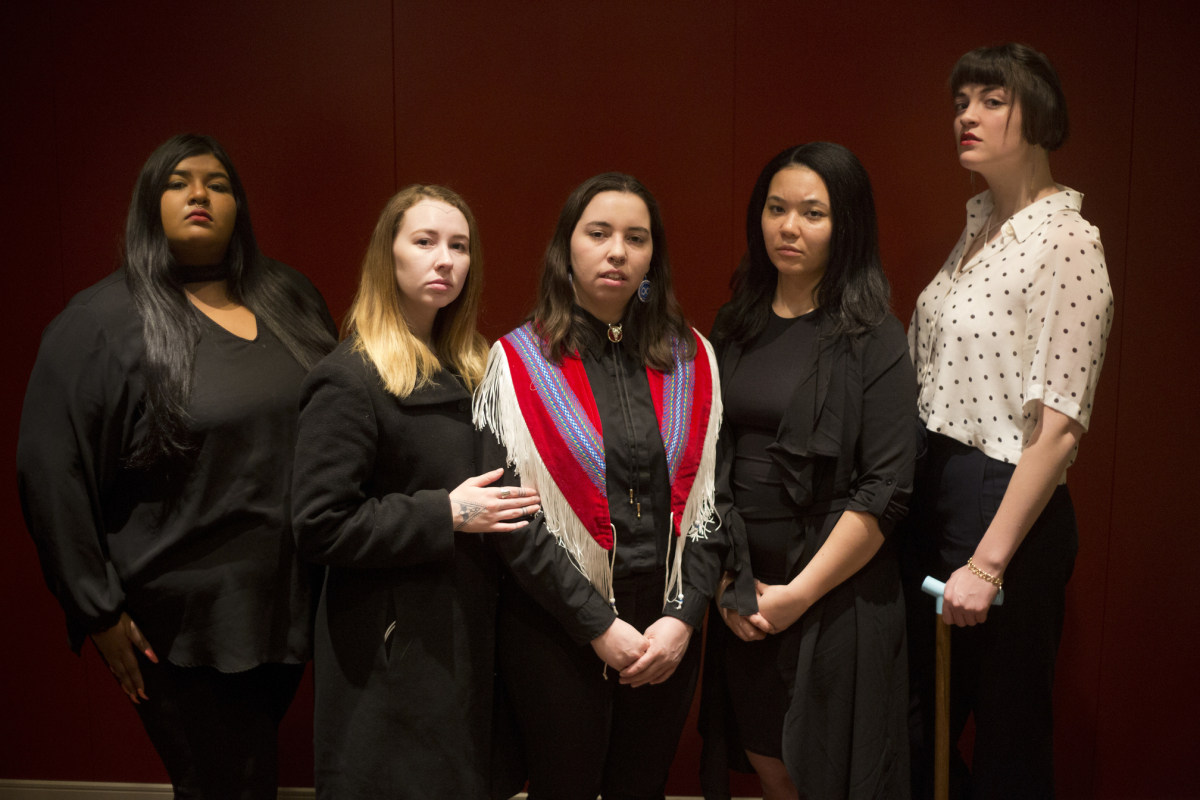
Wong said she spent all four days of the event listening and consoling delegates who shared their bullied experiences with her — because no one else was helping them.
“I still carry that weight in my heart, knowing that this organization that I worked for, who put up an event that is about empowering women, young women particularly, has created so much harm,” she said. “I am also carrying that harm on behalf of Equal Voice because they had no one else to go to. They couldn't go to their fellow delegates, they couldn't go to the management, because the management wasn’t listening to them.”
Steele and Moumouni-Tchouassi said they stayed up till 4 a.m. most nights talking to delegates who would just walk into their hotel room “to break down and cry.” She said she brought it up to management multiple but was ignored.
“We had code words in case management or board members walked in so that they didn't know that we were discussing how toxic the space was,” Steele said.
Moumouni-Tchouassi recalled asking Equal Voice to consider not having alcohol at the Daughters of the Vote. As delegate co-ordinator, she had conducted surveys with past delegates who suggested alcohol had made some interactions uncomfortable. It would also help make the environment more accommodating for delegates who were Muslim or Indigenous.
The response left her shaken, she recalled: A manager told her, “If they can’t be around alcohol, they’ll never make it on the Hill.”
How they were fired
After months of fighting with no change, the women took their frustrations to their private social media.
“We had literally been banging our heads against the wall,” Wong said. “Like legitimately every meeting, we would bring up the issue of equity, ask: 'When will this workplace be safe and equitable for all staff and all women?'”
Steele wrote on her Instagram story that her executive director — without naming her or the organization — was an “ignorant white colonizer.”
“As an Indigenous person I refer to non-Indigenous people as ‘colonizers’ or ‘settlers’ all the time,” she said in an interview. “At no point have I ever been told that that's a derogatory term. I didn't know that it was racism to refer to someone as ‘white.'”
Moumouni-Tchouassi shared Steele’s story on her personal Instagram, as did Wong.
A week later, they were fired.
All three had received strongly worded emails in the weeks prior. After one staff meeting about workplace conduct — such as inconsistent attendance, streaming videos at work or searching for jobs while at work — both Steele and Moumouni-Tchouassi wrote long, concerned emails to Fast, saying they believed her to be indifferent to the differing workplace requirements of each staff member. These included flexible work hours (contractually agreed upon for many with accessibility needs), among others. They accused Fast of “gaslighting” in the emails and contributing to an unsafe and inequitable environment.
Equal Voice National Chair Nicole Foster was copied on this email conversation and replied by saying she was “deeply concerned with the content and tone of these emails, which are insulting of Ms. Fast both personally and in her professional capacity as Executive Director.”
Wong also received an email after she made an Instagram story commenting on the whiteness of the four female candidates running in her riding of Ottawa Centre, calling one of them “a Nazi defender.” Fast wrote an email to her stating she had been made aware of the social media post with “negative comments about women candidates” and was concerned about this behaviour would “negatively impact (Wong's) ability to represent Equal Voice without conversation turning to (Wong's) personal views.”
There is a difference in perception of how these conversations went. While Fast cannot talk about it for privacy and legal reasons, the women say the terminations took them by surprise.
“We’ve had so many conversations about accountability, accommodation, respect,” Moumouni-Tchouassi said. “I was surprised by the fact that (Fast) was characterizing my concerns and my colleagues’ concerns as ‘harassment.’”
(An Equal Voice official said that harassment is defined in their organization’s workplace policy, which all staff have access to and are aware of, and that the conduct being referred to would reasonably be considered inappropriate under these guidelines.)
“I have tried everything within my power to help make this organization more equitable,” Wong said. “Every time I brought it up, I got graded and I was called intolerable.”
‘It’s been a very difficult few days at Equal Voice'
In recent months, Equal Voice has also lost their equity co-ordinator and another woman of colour on staff, who both chose not to speak to National Observer for fear of retribution.
And before the termination of Wong, Steele and Moumouni-Tchouassi, a few members of the Equal Voice equity committee — which was created by newly elected board members, some of whom had experienced the issues of racism and exclusion at the first Daughters of the Vote in 2017 — also resigned.
A spokesperson for Maryam Monsef, the minister for women and gender equality, said the department cannot comment on the matter.
But the reaction online has been very supportive for the three women, with many coming forward with their own stories of discriminatory experiences as delegates, staffers and volunteers with Equal Voice and donating to a GoFundMe page set up to support the recently fired women.
“It’s been a very difficult few days at Equal Voice,” Fast said in a phone interview. “We take all these concerns extremely, extremely seriously here.”
Fast said the organization was in “a period of reflection” after the Daughters of the Vote conference in April. Equal Voice has been surveying the delegates and meeting with stakeholders to figure out a way “of shaking up the program with potential task forces and ensuring that past delegates see that we’re implementing the concerns they have.”
“We’re very committed to reviewing and reworking,” she added. “It’s an ongoing process” that will see Equal Voice train its staff in equity, diversity and inclusion and also review all of its staff to ensure “we’re really equipped as an organization to create the best possible experience and is inclusive.”
“We hear you. We take it really seriously. And we’re very concerned when people have a negative experience in anything related to Equal Voice,” Fast said. “It’s always hard to hear criticism but it helps us grow.”
Editor's note: This story was edited on August 2, 2019 at 12.01 p.m. to accurate reflect the reason Jacqueline Hall was hired at Equal Voice.

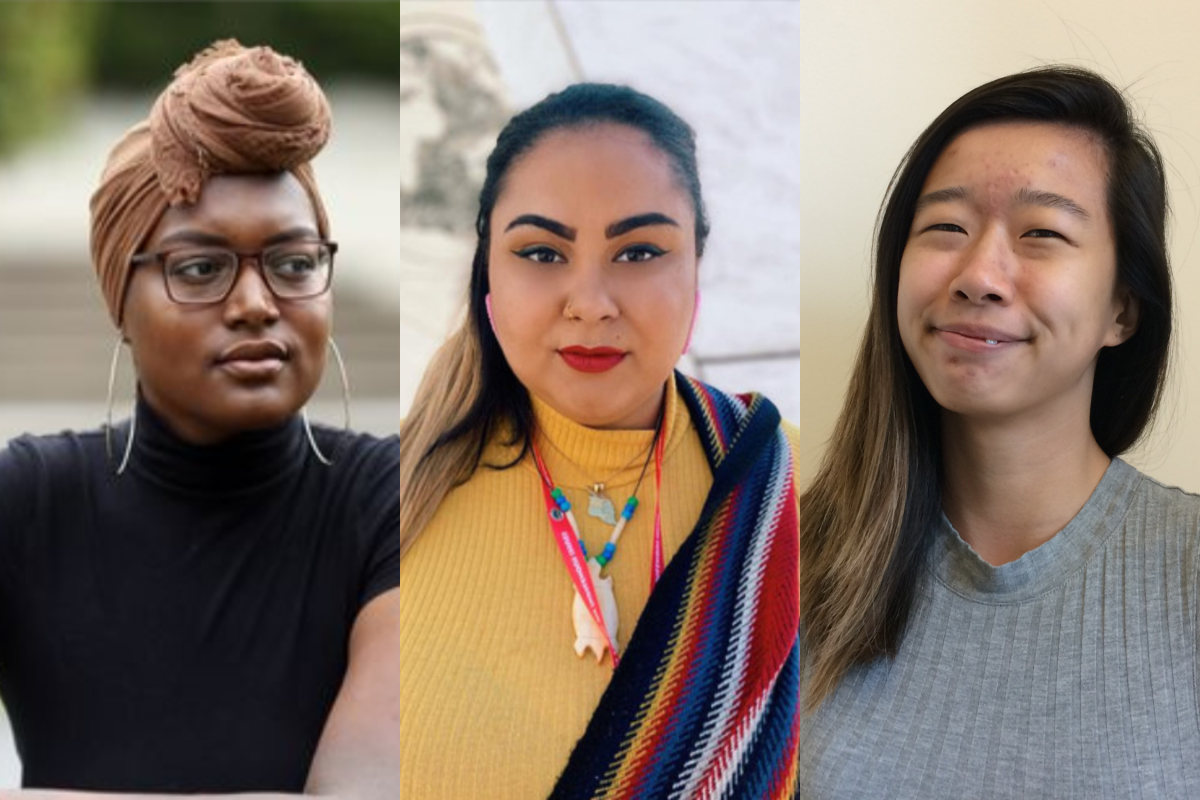

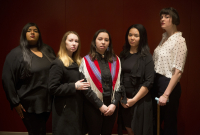
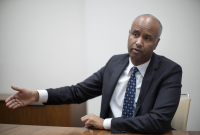
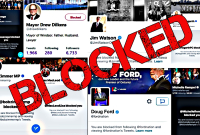
Comments
Personally, I find all disparaging references to groups of individuals, including those based on skin color, to be unacceptable.
Never for a moment do I question that many of the epithets applied to aboriginal peoples and individuals of color are disparaging, even when numbers of people of color I know don't agree, because many do.
I'm old enough to remember several versions of categorization that was considered to be politically correct vis a vis people of African ancestral roots. In the 50s, "nigger" was ignorant/bad; "negro" was correct. In the 60s/70s, "negro" (mocked as "knee-grow") was bad, and "black" was correct. Then "black" became bad ... and so it goes.
I do wonder why it's seemingly acceptable, generally, to call all "white people" "settlers" and "colonizers," in clearly disparaging ways.
Surely, ultimately, the problem is not *how* people are classified, but *that* they are, in "separating" and disparaging ways.
People of various ancestries have been, in turn, denigrated by name-calling arising from and geared to prejudice, white European immigrants included ... along with at various times those of Asian extraction. (And when I write that, I wonder if "extraction" might be politically incorrect, as well.)
Vis a vis grass-roots groups funded by government and large charities, I've been around a few of them that operated entirely on the basis of the personal financial/political interests of senior management. Needless to say, pushing for the organization's constitution/by-laws/mandate to be met (or even legislation governing their operation) , over those interests, is to automatically be made persona non-grata.
I learned to pick my battles, not to mention playing fields, but just won't "play along to get along." I was quite amused at the first few political commentators, including those I thought to be uncommonly astute, wondering what Jody Wilson-Raybould's "long term game plan" was ... and then dismayed when it became clear how few recognize (or care about) integrity at all ... or rule of law.
It certainly appears that the leadership of Equal Voice has stumbled badly over their ostensibly good intentions. It only goes to prove how easily even those with good will can fatally misjudge their actions through the all too human inability to "walk in another's shoes". We are, always, the sum of our experiences, influences and the seething unconscience.
It takes a supreme act of will and grace to acknowledge fallibility and ignorance, and to exist in a state of humility. People who seek out opportunities to "do good" to lead others, to "make a difference" sometimes succumb to the ancient grecian sin of hubris. The common definition is arrogant pride or presumption - the belief that oneself is indispensible, and perhaps divinely appointed to "run things". Other peoples' realities are irrelevant and must be subsumed by the larger vision. This is how missionary work gets its bad reputation. "Missionaries" come in all shades of values, beliefs, (mostly mistaken) and behaviours.
Equal Voice and its controlling cadre do seem to exhibit this lamentable human trait.